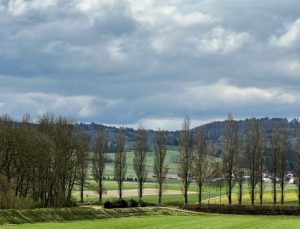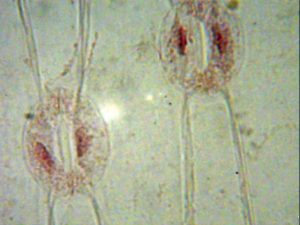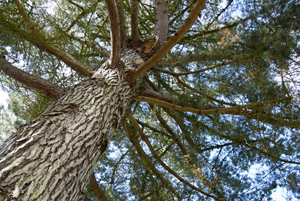Woodland web updates – 20.

Super fast poplar trees ?
In theory, increasing the number of trees across the globe could help reduce the levels of atmospheric carbon dioxide that are so intimately associated with climate change. As trees grow, they absorb carbon dioxide from the air turning into wood. This effectively locks away the carbon for a period of time. However, the growth of trees can be slow so if trees could be ‘persuaded’ to grow faster then more carbon could be ‘locked up’
A San Francisco based company called “Living Carbon” has genetically modified hybrid poplar trees to speed up photosynthesis so that they grow faster. They picked on the poplar trees as their genome had already been sequenced. The work of Living Carbon is at early stage and further work is needed to see if the enhanced photosynthetic rates and growth are maintained over the life time of the modified trees. Another possible benefit of these modified trees is that they might help restore damaged land as their roots also grow faster, helping to address soil erosion. Further details are available on their website : https://www.livingcarbon.com/
A discussion about the value / usefulness of such trees in affecting climate change / carbon sequestration was featured in the BBC program Positive Thinking this week.
Effects of climate change.
Climate change is associated with extreme weather events, such as flooding, heat waves and prolonged periods of drought. American scientists at Ohio State University have been looking at the effects of higher temperatures and lower water availability on fungal infection in Austrian pines.
They found that within three days of infection (by certain fungi - Diplodia species), the warmer and drier conditions resulted in
- Reduced photosynthesis by the tree
- Enhanced removal of carbon resources of the tree to the fungus.
This means that there are fewer sugars and other metabolites available to the tree for growth (and defence against infection). It would seem that a warming climate will render many trees more susceptible to invasion by various pathogens.
Full details of this research here.
Stressed out plants.
Thale cress or Arabidopsis thaliana is a small flowering plant, that is native to many parts of Europe and Asia. It is generally viewed as a weed, found by roadsides and on disturbed land. It is an annual that has a short life cycle. Its genome was one of the first to be sequenced. It has become a popular plant in the researching of the biology of flowering, light sensing and understanding the molecular biology of many plant traits, including flower development and light sensing.
 Recently it has been used to investigate the stress response to heat, intense sun and drought. Such stresses result in the production of reactive oxygen species (ROS). High levels of ROS are lethal but low level of ROS are a signal to the plant to protect itself. This is done through the photosynetic machinery which generates an ‘alarm molecule’ (MEcPP). As this molecules accumulates in the plant, it in turn triggers the production of salicylic acid (essentially a form of aspirin). This helps protect the chloroplast from damage. Salicyclic acid is involved in many plant systems, notably defence against infection but also germination and stomatal physiology.
Recently it has been used to investigate the stress response to heat, intense sun and drought. Such stresses result in the production of reactive oxygen species (ROS). High levels of ROS are lethal but low level of ROS are a signal to the plant to protect itself. This is done through the photosynetic machinery which generates an ‘alarm molecule’ (MEcPP). As this molecules accumulates in the plant, it in turn triggers the production of salicylic acid (essentially a form of aspirin). This helps protect the chloroplast from damage. Salicyclic acid is involved in many plant systems, notably defence against infection but also germination and stomatal physiology.
Comments are closed for this post.

